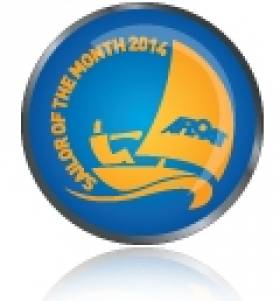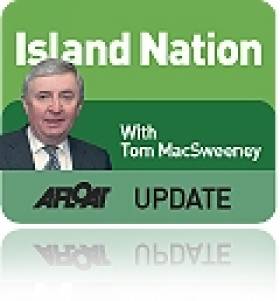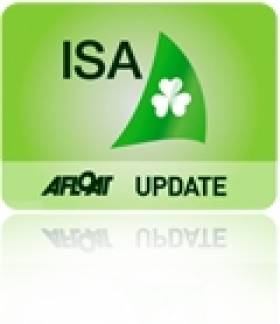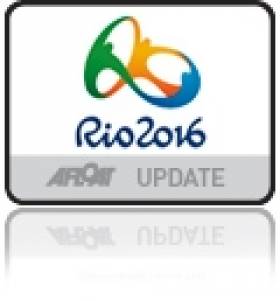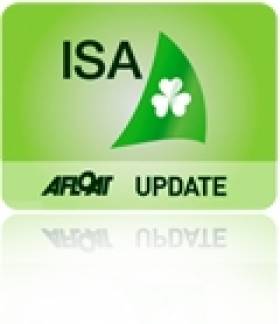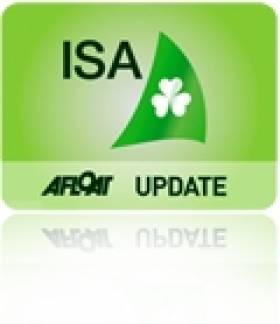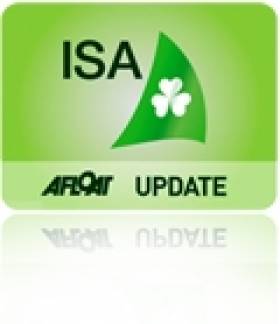Displaying items by tag: ISA
#soy – The new stars of the Irish sailing firmament are Anthony O'Leary (57) of Cork and the successful Commodore's Cup team. In a gala ceremony in Dublin this afternoon to celebrate the many achievements of our sailors in 2014, O'Leary and his team mates were applauded as the crème de a crème, reflecting his own insistence throughout the exemplary Commodore's campaign that it was only by a close-knit group effort that success could be obtained.
The sharing of the award - presented in a crowded gathering of Ireland's diverse sailing community in the Royal College of Surgeons by Minister for the Marine Simon Coveney on behalf of the Irish Sailing Association and Afloat.ie - proved to be doubly appropriate, as O'Leary himself could not be present owing to a longterm commitment to a week-long sailing campaign currently under way in Florida.
However, his son Rob – a former Sailor of the Month himself - accepted the Afloat.ie Sailor of the Month award for June 2014 on his father's behalf. That award was to celebrate Anthony O'Leary's success in being the overall winner of the British Open IRC Championship.
But after that, his personal achievements continued at a high level throughout the season, as he became the Helmsmans Champion 2014 early in September racing with the J/80s in Howth, and then later that same month he won through to be the 1720 National Champion racing in Baltimore.
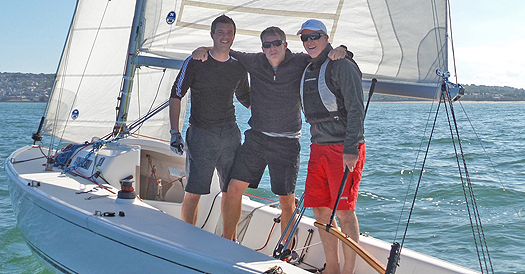
Anthony O'Leary (right) and his crew Dylan Gannon (left) and Dan O'Grady celebrate All Ireland victory off Howth in the Helmsmans Champs. Photo: Jonathan Wormald
That this all occurred within weeks of his brilliant leading of the Commodore's Cup team during the last week of July gives some indication of the enormous contribution made by Anthony O'Leary to Irish sailing during 2014.
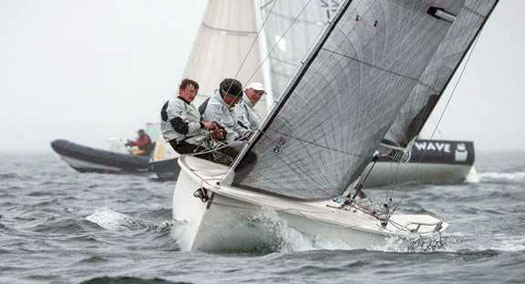
1720 National Champions – Anthony O'Leary's Antix crew in winning form again off Baltimore. Photo: Aedan Coffey
But as the Commodore's Cup win also saw the Afloat.ie International Award for July being made to the entire team, the Sailor of the Year 2014 was jointly presented to Rob O'Leary standing in for his father, and to Michael Boyd, recently elected Commodore of the Royal Ocean Racing Club, who was one of the Irish skippers in the superb Commodore's Cup team.
It is the second time the Crosshaven skipper has won the Irish Sailor of the Year title, he lifted it first in 2010.
Transforming Ireland into a Pre-eminent European Sailing Nation
#irishsailing – After tweeting 'neither Afloat nor the Irish Sailing Association understand the makeup of sailors in Ireland', author Alex Blackwell gives his personal view on this week's ISA Public Meeting in Galway and on the way ahead for Irish sailing.
Sixty people from as far afield as Dun Laoghaire, from sixteen different sailing clubs, and four training centres converged on Galway Bay Sailing Club on Tuesday February 24th for the final Regional Meeting to discuss the ISA Strategic Plan 2015-2020. Chaired by GBSC's Pierce Purcell (ISA Director) and presented by Neil Murphy (ex ISA President and Chairman of the Planning Group which was operational in the final three months of 2014), the first hour was taken up with a detailed explanation of the Draft Plan, with interjections by Neil Murphy of things that have already been decided should be changed. As he put it, there were many good suggestions made at the previous two meetings, as well as in individual submissions. For the attendees, many of whom had come bearing copious notes, this often meant a reduction of what might need to be brought up.
As Neil Murphy explained, the original list of tasks had taken up over forty pages. This had been whittled down to the document at hand. Some things had been cut that should not have been. One such item was Paralympic Sailing, which as we all know has been cut by the International Paralympic Committee. This has now been reinstated in the ISA plan. It can only be hoped that the ISA will indeed take the IPC and the ISAF Disabled Sailing Committee to task on this.
The plan itself, when finalised before the end of March and voted on in the ISA Annual General Meeting on 28/03/15 in Port Laoise, will constitute the working doctrine for the ISA and its staff right through to 2020. Though 'written in stone' after the AGM, changes may of course be decided on in upcoming AGMs or EGMs.
Neil Murphy made a point of explaining that henceforth any discussion would be about "sailing" as opposed to "the sport of sailing", an issue brought up previously that the Committee felt strongly about. The understanding was that by using the term 'sport', a significant segment of the sailing and boating community was potentially excluded. It was also felt that using this term might be felt by some as elitist and infer that sailing is all about racing. Presumably since this turn of phrase is so deeply ingrained in most sailors, he then went on to almost exclusively refer to 'the sport' or 'the sport of sailing'. But there is hope.
He also brought up that, based on previous input, the ISA had started an initiative with regards to diesel fuel availability. The EU has dictated that leisure craft may only use unmarked (taxed) white diesel. However this is simply not and will not be available with the exception of mere handful of harbours, mostly in clusters around Dublin and Cork, or inland service stations which are inaccessible to visiting boats. Another issue was that the junior sailing programmes would be restructured, with greater emphasis placed on two person boats, and less on the current boat classes.
At the end of his presentation he received a warm round of applause. Almost every subsequent commentator remarked on the excellent work the committee had done in producing this document.
The ensuing discussion, during which some impassioned contributions were made, was not without some serious criticism; similar one might add to what actually happened in Cork. The first point raised was the Small Craft Register, where the ISA had suddenly folded to Government pressure without first ensuring that a working replacement was in place. This is an entirely untenable situation. Irish yachts abroad, and those wishing to go abroad are being forced to flag out to Britain, otherwise they face impoundment, either scenario being undesirable.
Another concern raised was that the stakeholders, key to the growth of sailing, had been omitted in creating a document entirely focussed on clubs, access, training, competition (racing), and culminating in the Olympics. These are the actual members and their concerns, the general public, from whom the clubs (and the ISA) draw their members, and last, but by no means least, the Government. It was pointed out that the RYA's primary focus in their manifesto is "...to ensure that legislators, regulators, and other authorities understand, and take account of, recreational boating activity." It had already been brought up in Cork that the ISA needs to be constantly in the forefront as an advocacy body in respect to sailor's freedoms and interests, and this was reiterated in Galway.
A representation was also made by another significant stakeholder group: the Sailing Businesses. Over-regulated and under-supported, these provide the goods and services all sailors and boaters need; not to mention the innovations required to advance design and technology – a 'minor detail' essential to Ireland being in the forefront of High Performance (Olympic and international class) sailing. This also includes high profile events, such as the Volvo Ocean Race, which came to Galway twice in recent years, producing two of the biggest 'sporting' events in Irish history.
A point that was raised at previous meetings and was brought up again was that the draft plan was all about racing, culminating in 'High Performance'. It was argued that racing sailors were in the minority and that this emphasis was inappropriate. According to statistics issued by the RYA (the ISA has published none) the ratio is 6-1 Club Cruisers to Club Racers. Ireland is likely similar to the UK in this regard. Another observation was that in any given club for every boat going out on the race course between five and ten remained at their mooring or in their slip. Mr. Murphy countered this contending that 60% of sailors in Ireland are racers.
A quick informal survey revealed once again that statistics can always be portrayed in a way that underpins a particular argument. Whereas most cruising boat owners who participate in club racing would consider themselves cruisers, and some racing boat owners would indeed do the same, their respective crew members (up to ten per boat), who only race and rarely have an opportunity to cruise, would almost all consider themselves racing sailors.
Perhaps we can agree that the 'Corinthian' approach would be appropriate: to promote 'sailing' and not harp on racing (as in the draft document) or cruising. We are one community with one goal. We all love sailing and wish to help promote it; be it racing around the cans, coastal cruising, adventure sailing, or simply messing about in boats. This is what needs to be reflected in the plan.
Women sailing also made for some interesting discussion between the floor and the head table. The question was raised why there were only two or three women in a room full of men. The ISA had in the past done some initiatives to get more women sailing. However, as they were implemented, these had been so far from the mark that they had in fact put women off. On the day, the women had to take the helm in a regatta without any prior experience. The 'plan' should, it was subsequently suggested, encourage comprehensive women's sailing programmes. This brought many comments about what good skippers women who actively sail do make.
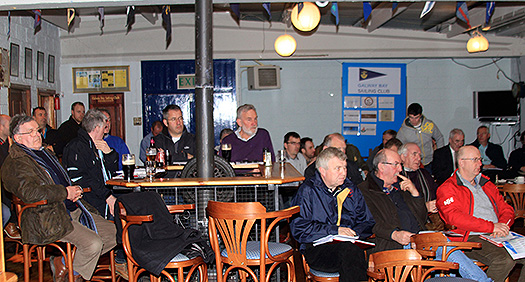
The attendance at the meeting in Galway Bay Sailing Club included representatives from sixteen clubs in the west and four training centres
Class associations were also represented, and the Mirror was highlighted. Ireland's own Olympian Annalise Murphy 'honed her skills' in a Mirror Dinghy. There are countless Mirrors in sheds and garages nationwide. With the dinghy sailing focus changing to a two person boat, perhaps the clubs could bring these back out into use.
It was also pointed out that more outbound communication (PR) should be done about the high profile events taking place in Ireland, and also the fantastic people we have in the racing, cruising, and adventure sailing scenes. All of these would do a huge job in elevating the public perception of sailing in general and thus also help to promote our ambitions with high profile events like the Olympics.
The bombshell for the majority of those present, not being ISA insiders, arrived when the question of voting rights at the Annual General meeting was raised. Votes are cast en bloc by each club based on their membership (and subscription) levels. The 'Big Six' clubs on the east and south coasts, therefore carry roughly half of the votes, irrespective of who actually attends the meeting.
It is almost impossible for an individual or a small club to have any say. Intentionally or inadvertently, the "block vote" system has the effect of suppressing dissent and perpetuating the status quo. A block vote system like this was used by the trades unions to control the British Labour Party until it was abolished in 1994 in favour of one member, one vote.
Small wonder then, that the smaller clubs, which are the majority of the clubs in the rest of the country, continue to feel under supported and under represented by the ISA. As the main mission of ISA must be to serve its members and to grow interest and participation in sailing in all its forms, the strategic plan must be broadened to encompass all the representative points of view.
Alex Blackwell is an author and sailor who lives on the shores of Clew Bay in County Mayo where he bases his Bowman 57 Aleria.
Difficult Waters for Irish Sailing, Just 17,000 Registered Leisure Sailors in Ireland
#irishsailing – There are just 17,000 registered leisure sailors in Ireland at present. There has been a decline in sailing, the level of activity has weakened, clubs are losing membership and several marinas have space available for the first time.
The only official participation figure available is for those 17,000 members of clubs registered with the Irish Sailing Association. There are many more sailors who own boats and use them outside of the club structures, so the actual participation levels could be two or three times that number. But there is no doubt about the decline in activity in the sport. The effects of the economic recession, people having less disposable income, loss of jobs, emigration, have all had their effects.
Brian Craig, one of the Directors of the ISA discusses the challenges facing the sport in a frank and direct interview on the current edition of THIS ISLAND NATION, the niche maritime radio programme, which you can hear here. The interview ranges across the still-present perception of the sport as 'elitist' and the methods needed to change this and to increase involvement in the sport.
"There is still a strong core foundation to the sport," Brian Craig says in the interview which discusses the Strategic Plan the Association has drawn up and which has been considered at meetings of ISA members around the country.
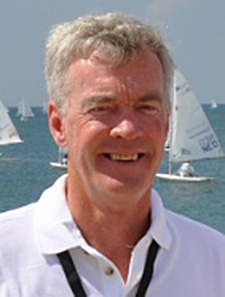
Brian Craig
The plan will be put before the ISA annual general meeting in Portlaoise on March 28 for adoption.
GOVERNMENT THINKS THERE IS AN IRISH LANDBRIDGE!
"We are a funny country. We are surrounded by water. We have a Government that thinks there is a landbridge somewhere, but they don't know where it is."
That was the comment of former seafarer Tom O'Mahony when he spoke to the programme at the annual Remembrance Ceremony for those lost at sea in the town of Youghal on the East Cork coastline. It is a coastal town with a great schooner tradition and memories of seafarers who ranged from the River Blackwater onto the world's oceans in various types of vessels. It is also where the programme is compiled, edited, recorded and transmitted every Monday fortnight at 6.30 p.m. and later each fortnight on Near FM in Dublin, Dundalk FM, Dublin South FM and Raidio Corca Baiscinn in County Clare as well as on this website.
Tom O'Mahony said there was a lack of maritime awareness at Government level and recalled the closure of Irish Shipping and the manner in which ships and crews were stranded overseas and men later left without pensions. "And that was company in which seafarers had gone to sea in ships that would not now pass maritime safety requirements."
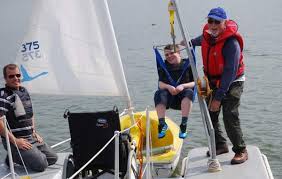
DISABLED SAILING
The RNLI describes a very courageous disabled sailor on the programme in contrast to the decision of the Paralympics Committee to discard sailing from its programme.
NO PLACE FOR BEING POSH OR A FIGUREHEAD
Also discussed on THIS ISLAND NATION is the use of nautical descriptions in everyday language, such as 'posh,' being a 'figurehead' and 'flogging a dead horse."
Former Sailing President Calls For Sport to 'Regrow in a Balanced Way'
#sailing – A leading Cork sailing official who praises the reform of the Irish Sailing Association (ISA) has raised concerns over a new initiative to raise €2.7m for Irish Olympic and ISA pathway sailing. The comments follow a reader piece yesterday: Is Being an Olympic Sport Good for Irish Sailing?
Barry Rose, a former ISA President, says it is 'incredible' during a period of consultation by the ISA that the sailing community was not asked about the set–up of a 'new quango' called the 'Irish Sailing Foundation'. In a sport that is attempting to navigate its way out of recession, Rose warns If resources are 'sucked out of a limited pot' it will effect the ability of Clubs. The challenge, he says, is to 'regrow in a balanced way'.
Firstly I want to state that I fully support the high calibre current Olympic sailing campaigns that I believe have real chances to produce sailing medals that will lift our sport at the next Rio Olympics. Annalise's fantastic performance at the last Olympics richly deserved a medal and lifted all our enthusiasm for the sport. Watching the medal race in Newenhams in Schull was like watching a Six Nations final. It was great.
The current reform and re–connect with the grassroots of sailing taking place in ISA is admirable and needs to happen. Well done to the team driving this through. It seems incredible to me that in the middle of this process without consultation with the wider sport and seemingly out of the blue an advertisement would appear for a CEO of what appears to be a new quango called ISF (apparently under the auspices of the ISA) whose brief is to raise €2.7m a year from a tight economy for elite and Olympic sailing in addition to funds currently generated.
Where has this come from? If this amount of resources is sucked out of a limited pot will it effect the ability of the grassroots to raise funds for Clubs and the events that form the backbone of the sport on the ground in the form of sponsorship and funding vital support structures to grow the wider sport.
We live in interesting times for our sport. There are green shoots everywhere. Enthusiastic sailors and volunteers on the ground are driving the sport in positive directions. Classes like the National 18s are re inventing themselves with a new boat and double figures ordered in its first year, the well organised RS classes are attracting great sailors back in to dinghy sailing in two man dinghies and are having a blast in cool competitive boats at reasonable cost for all age groups. The dynamic of each Class sailing together Fevas, 200s and 400s has really worked with a fun friendly inter reaction at events. Clubs are developing fleets of 1720s and dinghies to offer opportunities to get on the water without owning a boat and grow the sport.
On the Cruiser Racing front ICRA are promoting the sector enthusiastically despite the economic environment and initiating crew training programmes (with ISA support) and growing ever stronger National Championships. Strong Irish teams have won two Commodore's Cups since 2010 exposing many young and some not so young Irish sailors to the highest level of Competition in this field in what is effectively the World Championship of IRC racing. This has happened with incredible commitment by dedicated owners, sailors and a voluntary support team effort by ICRA who are endeavouring to raise some funding support for these types of Irish International challenges.These teams have brought huge credit to Irish sailing displaying a clinical winning approach to every detail on and off the water in significant International events.
We need at this time to plot a careful course for all our sport to regrow in a balanced way that supports the great enthusiasm and innovation that is driving bringing the fun back in to sailing from the ground up in all aspects of the sport.
The Glass is definitely half full not half empty, let's not knock it over! That's the challenge!
Well done for raising the question! It's healthy to debate and reflect!
Cork Sailors Hear About New ISA Plan For Irish Sailing
#irishsailing – The Irish Sailing Association SRG (Strategic Review Committee) penultimate meeting of the series took place last evening at the Rochestown Park Hotel, Cork and drew an excellent attendance with a large number of representatives from southern clubs and sailing establishments in attendance and sailing instructors were also well represented. Claire Bateman reports.
The meeting was chaired by former RCYC Admiral David O'Brien, Dublin SRG representatives who travelled were Brian Craig and former ISA Presidents Neil Murphy and Roger Bannon, and Harry Hermon of the ISA.
A full copy of the ISA Strategic plan until 2020 can be found here.
The meeting commenced at 7pm with an introduction by David O'Brien followed by Neil Murphy who took the meeting through the Strategic Plan line by line. The attendance had been requested to hold questions until the presentation was complete and this request was duly complied with. The Q & A session began at approximately 8.50pm with the meeting scheduled to finish at 9pm. People had a lot of points to make and the meeting finally concluded at approximately 9.45pm.
It could have been a meeting from some twenty years ago and this was no bad thing. Some very old chestnuts were still being aired along with some new topics and indeed some views being expressed from the top table were still unchanged from former years. As one would expect from the wonderful cruising areas in the south west, cruising got a good airing from several quarters with changes being requested in recognition of the importance of this branch of sailing. Also, the importance of motor boating was raised with the rise in numbers of such craft now being seen and, indeed as pointed out by Vice Admiral John Roche of RCYC, there are now some thirty to forty such boats on the RCYC marina and other speakers pointed out this is reflected in clubs all around the country.
A thorny area drew huge response from the meeting and this was the situation regarding RYA courses. Currently RYA instructors are giving courses in this country and these instructors will in be working here and it was pointed out these courses are fully recognised outside Ireland while the ISA Instructor courses have no such recognition. The question of frequent compulsory revalidation also proved to be a hot topic and one that the Instructors have requested to be looked at. The lack of availability of qualified instructors also came up for discussion. The ISA Pathway also came up for discussion and is another area to be looked at.
The ISA's view on the question of promoting two person boats over single handed dinghies, desirable and all as the idea may be to some people, came into sharp focus in a week where a sell out mid term sail training week for Optimists in Baltimore SC is being attended by 150 Optimist sailors and their families from all corners of Ireland. Indeed, your scribe, residing near the main route to West Cork, could describe the numbers of vehicles travelling west complete with packed roof boxes and trailers piled high with all the gear while the car interiors showed parents, youngsters and in a lot of cases family mutts, all heading to a week of hard training for the enthusiasts and a fun week for the younger family members and hopefully for the parents and indeed for the village of Baltimore. By all accounts this is exactly what is taking place.
There was a view put forward from the top table that an Optimist sailor coming out of the ranks when it was time to move on would have no knowledge of sailing coming out of a "little box of a boat". Here I have to disagree strongly. Now, I am no great Optimist fan but I have watched these sailors and their knowledge of sailing can be quite fantastic and their experience of different sails in knowing what is needed for different weights and conditions is absolutely tremendous. They go to sea in conditions that leave the rest of the fleets high and dry and enjoy themselves experiencing conditions the experienced hardy annuals would baulk at. Pay a visit to the Royal Cork Yacht Club during any school holidays and you will find the Oppie Skippers sailing anything and everything they can get their hands on. They will go out in Topaz, 420's, Fevas, International 14's, Toppers, you name it and they will be found.
They also join the club racing/cruising fleets as crew and can be found doing on board crew tasks on the these boats and will also helm. Where did Sir Ben Ainslie commence his sailing career? In an Optimist of course. Last word on this, on one occasion when the ISA were really pushing two person boats, one in particular, the parents responded by deciding to buy Laser 2's in large numbers against the recommendation of the ISA. A world championship for these boats was held in Crosshaven with large numbers in attendance. Where are they now?
The appreciation for the hard work of the SRG Committee was expressed by all and the members thanked for coming to Cork. The last meeting of the series will be held in Galway and the final item on the SRG agenda for the moment will be to try to ensure the adoption of the SRG Plan. If sailors have strong views to express they should make the effort to be present at the Maldron Hotel, Portlaoise at 11.30am on March 28th. If you are not there you cannot complain afterwards if an item was passed you did not agree with without at least having the chance to express your opinion.
A good humoured meeting at the Rochestown Park Hotel in Cork and devoid of any real controversy.
Just Who Do The Irish Sailing Association Think They Are?
#irishsailing – Ireland's national sailing authority has been going through turbulent times in recent years. With unprecedented expansion of ISA staff numbers as the country revelled in the boom years of the Celtic Tiger, the arrival of the inevitable and abrupt financial downturn found an Association bloated, unfit to cope, and out of touch with ordinary sailors.
High profile events, top level training and international participation had become so dominant in the ISA's range of activities that many of the ordinary sailors of Ireland already felt the Association was no longer relevant to their own low key personal pursuit of friendly sport afloat.
When the crash came, it led to a marked decrease in active sailing numbers as disposable incomes fell away. People focused on keeping their jobs and businesses afloat rather than their boats sailing, while many promising young sailors were forced to emigrate.
This new reality was reflected by the growing disillusion of club officers, who saw their membership subscriptions decreasing even while the ISA – which is largely reliant on subvention from the clubs for its own income – seemed always to be looking for more money. And at the height of the boom years, when all the major clubs had put through significant expenditure in developing their facilities to international standards, the ISA had shown its lack of contact with the reality of club life by proposing its own stand-alone National Sailing Centre in Galway, a facility which would in effect have been run in rivalry to the main clubs. To the mutterings in the grass roots were added the rumblings from above as major clubs threatened to withhold their annual payment to the ISA unless real reform was initiated. W M Nixon takes up the story.
In a classic grass roots revolution, club sailors Norman Lee from Greystones in County Wicklow and Bryan Armstrong from Sligo were at first rebuffed when they tried to voice their concerns about the ISA's increasing irrelevance to the needs of the vast majority of sailing enthusiasts, people at local level who were doing their very best to keep the sport alive through torrid times.
The Irish sailing community now owes these two men and their supporters a debt of gratitude, for they believed in what they were saying and they refused to be turned aside. Eventually, in November 2013 moves were in place to establish a Review Group for the urgent analysis of all ISA activities, and its personnel drew comprehensively on Ireland's remarkable pool of people with hands-on experience of running successful sailing events and organisations.
It was chaired by Brian Craig of Dun Laoghaire who has headed up the organising team on more major and notably successful international sailing events in Dublin Bay than probably anyone else, and its able personnel included two former ISA Presidents - Roger Bannon of Dun Laoghaire and Neil Murphy of Malahide and Howth - who had both been noted for their skill in running a tight ship when they were in charge. With them was highly regarded International Race Officer Jack Roy of Dun Laoghaire, and renowned sailmaker/activist Des McWilliam of Crosshaven, who each year is inevitably seen in busy involvement afloat in more Irish sailing centres - large and small - than anyone else in the boat world.
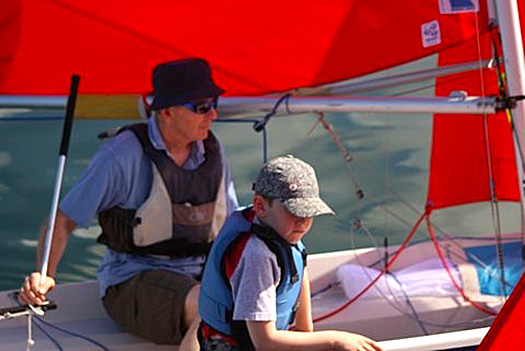
Bryan Amstrong of Sligo on the helm for a Mirror race
Also on board was one of the men from the barricades, Bryan Armstrong of Sligo. His background in a relatively remotely-located club which nevertheless has a long and distinguished sailing history made him uniquely qualified to voice the concerns of the grass roots. And we have to remember that all these people were giving voluntarily and generously of their time to this project in a period when Irish life was largely a matter of just getting through each day, while staying economically afloat was something of an achievement.
Primarily, the Review Group's function was to analyse the Association work on behalf of ordinary club sailors, as it was agreed that the Olympic and High Performance Divisions of the ISA's activities – which receive direct Sports Council grants – were in effect functioning as a different entity.
The Strategic Review Group was still work in progress when the ISA acquired a new President in David Lovegrove in March 2014, but by August the SRG published proposals which led to the setting up of a more formal body, the Planning Group. If this seems like a case of kicking the can down the road, it was anything but - these were people in a hurry, they'd got through the first stage of analysing areas where action was required, now they had to be more structured in coming up with clearcut ideas and concrete proposals.
This new Planning Group, which went into action in early Autumn 2014, was chaired by Neil Murphy, and its members included ISA President David Lovegrove, ISA Board Member Brian Craig, Ruth Ennis, Peter Redden, Sean Craig, and ISA CEO Harry Hermon, with noted Dun Laoghaire events administrator Ciara Dowling to provide administrative support.
They had their draft plan ready by mid-December 2014, and on January 21st 2015 Neil Murphy and his group publicly unveiled their analysis and proposals for the first time at a well-attended and very representative meeting in the Royal St George YC in Dun Laoghaire.
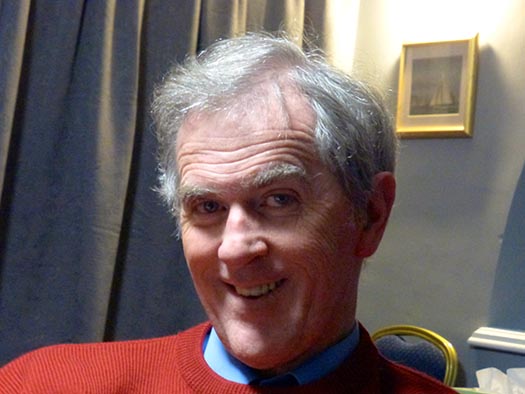 Neil Murphy is a former ISA President who, in addition to extensive experience as a Race Officer, is a typical club sailor, racing a Puppeteer 22 out of Howth. Photo: W M Nixon
Neil Murphy is a former ISA President who, in addition to extensive experience as a Race Officer, is a typical club sailor, racing a Puppeteer 22 out of Howth. Photo: W M Nixon
While those involved in setting the ISA on a healthier course are mostly working on a voluntary basis, it has to be said that the PowerPoint presentation and the printed material was of the highest professional class. In fact, it was much better than many professional shows I've been to, and the level of thought which went into a wide range of questions from the floor answered by Neil Murphy, Brian Craig and David Lovegrove generated a growing level of goodwill which concluded with Norman Lee voicing his congratulations and good wishes for this continuing process in which he and Bryan Armstrong had played such a key role.
So now we move on to the next stage – taking the ideas to the rest of the country. Doubtless you'll have noted the double meaning in titling this piece 'Just Who Do The ISA Think They Are?' In a first interpretation, that question is the one for which, let's hope, we are all now involved in working together in providing and implementing a satisfactory answer.
But equally, as the ISA Road Show gets out of Dublin to take this excellent presentation to a public meeting in Cork next week (it's in the Rochestown Park Hotel on Tuesday, Feb 17th, 7.0 pm to 9.0 pm) and then Galway the week after (Galway Bay Sailing Club, Tuesday 24th February 7.0 pm to 9.0pm), they'll be taking themselves into areas where experience of sailing administration long pre-dates the establishment of organised sailing on Dublin Bay.
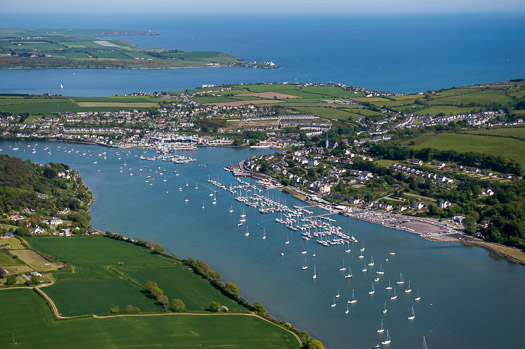 Crosshaven in the summer time. When we look at the natural advantages to be found here, it's little wonder that structured recreational sailing on Cork Harbour long-pre-dated any organised sport on Dublin Bay. Photo: Robert Bateman
Crosshaven in the summer time. When we look at the natural advantages to be found here, it's little wonder that structured recreational sailing on Cork Harbour long-pre-dated any organised sport on Dublin Bay. Photo: Robert Bateman
So you might well ask just just who do they think they are, these people from Dublin, going down to Cork to try to tell them how sailing should be organised? The nerve of them, doing it in a place where they've had organised sailing since 1720, and where the two biggest clubs – the Royal Cork and Kinsale – are both mighty establishments of international sailing repute which would remain so even were the ISA to disappear overnight in a puff of smoke...
And as for going west along the road to Galway, that will take them through Athlone where the Lough Ree Yacht Club dates back to 1770, while on the west coast the Royal Western of Ireland YC at Kilrush traces its origins back to 1828. Equally, further north along the Atlantic coast Sligo YC dates back to 1821, and in Lough Erne the club began in 1820. Yet the first club on Dublin Bay, the Royal Irish, only began as recently as 1831, and even then it barely hung in and had to be revived in 1846, with the pace being set in the meantime by the Royal St George YC, founded 1838.
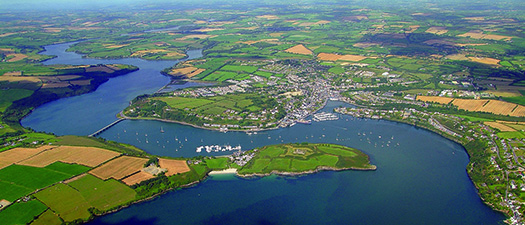
Kinsale is another harbour which seems to have been designed with sailing primarily in mind. Photo: Kevin Dwyer/courtesy ICC
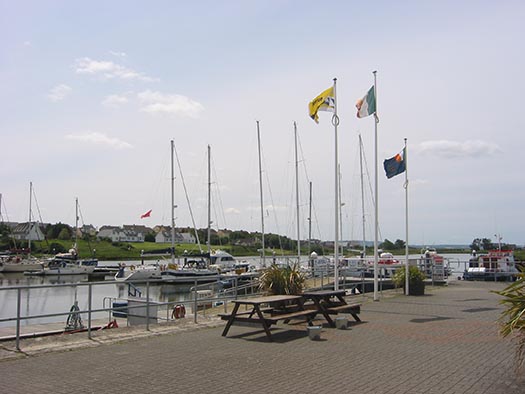
Kilrush on the Shannon Estuary had a club in being before there were any sailing institutions on Dublin Bay. Photo: W M Nixon
So in terms of sailing administration history, Dublin and Dun Laoghaire are only Johnny-come-lately places by comparison with just about everywhere else in Ireland. Yet thanks to the inevitable dominance of economic development, population growth and the strengthening centres of political power, we now find that sailing administration and decisions of national import are emanating from a place that, in terms of natural sailing advantages, lags far behind the rest of the country.
Oh for sure, Dun Laoghaire Harbour is a fabulous artificial amenity, and the advent of the new marina at Greystones has already been seized upon as greatly increasing the "cruising" options of Dublin Bay. But let's face it, Dublin Bay is really only good for racing, specific day sailing and training, whereas Cork Harbour and Kinsale provide such a variety of opportunities for interesting race courses, mini-cruises with multiple destinations and what have you, that in effect they're not just in a different part of the country – they're a different country altogether.

Dun Laoghaire is a totally artificial facility, and sailing options on Dublin Bay are limited. But it's inescapable that this is the primary point of leisure access to the sea for Ireland's largest and most affluent population. Photo: Kevin Dwyer/courtesy ICC
All of which adds to the difficulties of creating a meaningful national authority with which every sailing person can identify.
This business of Dublin v The Rest is not unique to sailing, of course, but when you have a specialist sport with multiple sub-branches of activity, the problem is exacerbated.
So please bear this in mind if you take yourself along to the meetings in Cork or Galway during the next ten days. This really is a genuine attempt to base the ISA within the sailing community at an everyday level of usefulness to all, with scope for growth while enhancing existing structures, and input from the sailing community at this stage will help in developing the ideas and initiatives proposed.
While the draft ISA Strategic Plan 2015-2020 very definitely puts the emphasis back on to the need for healthy well-run clubs as the basis for the sport, there was initially a feeling at the meeting on January 21st that the new-look ISA is not supportive of commercial sailing schools. In fact, what the new-look ISA hopes to do is encourage training schemes within clubs, while at the same time supporting commercial sailing schools where the demand is such that no club could realistically cope while maintaining its essential club ethos.
Going into this in more detail in a personal meeting this week with Neil Murphy, who is a Chartered Quantity Surveyor, we talked around the fact that a thriving club scene is central to the spirit of Irish sailing, and he was musing on the success of Sutton Dinghy Club where Hugh Gill heads up what is in effect a commercial sailing school within a club setting.
In fact, what Murphy would hope to see emerge at larger population centres is sailing's equivalent of the public golf course. Anyone who has used a public golf course will be aware that the proprietors are usually mustard keen to encourage the formation of a "club" within their customer base, and there is no reason why this shouldn't eventually take root in Irish sailing, providing access to sailing at a fraction of the cost of joining an established club.
It's not something which can realistically be objected to by established clubs trying to protect their own membership, as the people who would use a "public sailing club" would be those who simply couldn't afford to go sailing at all in the current traditional club setup.
Nevertheless support for the established club setup is central to the new Strategic Plan, and the provision of Regional Development Officers to serve clubs directly is very much to the fore in the new thinking. But in looking over the figures published with the report, it's good to note that the ISA works with no less than 80 recognised training centres, while an encouraging statistic is that there are now 24 secondary schools in Ireland which include sailing as a regular part of their curriculum. Admittedly it's a long way from the French setup where every schoolkid is entitled by law to one week of sailing and one week of skiing per year, but in a country where an aversion to being on the water used to be thought inevitable, it's a step in the right direction.
All these considerations of inexpensive sailing are a whole world away from the stories of recent weeks and days about the ISA's High Performance Division seeking a fund-raising executive who will be tasked with finding €2.75 million per annum through philanthropic and other donations in order to help the funding of top level campaigns which we're not allowed to call Olympic campaigns, as apparently that is copyrighted by the Olympic Council, so we call them High Performance instead.
But apparently Government departments aren't restricted by this limitation on the use of the word Olympic, for it was bandied about like nobody's business in this week's news that the government is spending mightily through the Sports Council, with sailing being number three in all Ireland in terms of current Sports Council funding, with a total tag of €1,289,900.
Of course it's not all for specifically Olympic sailing, but it covers 103 sailors from Optimists to the Olympics. Which is fine and dandy for those who are mad keen to race at the highest level, but most sailors in Ireland are much more interested in performing well within their chosen area and boat class, but with sailing being just part of a reasonably civilised and well-balanced life.
And as became evident at the meeting on January 21st, there's an increasing number of people who feel that sailing needs to realise that there's a sizeable population out there of folk who'd like to go sailing, but don't feel the almost religious vocation to own a boat.
With the rapid expansion of sunshine sailing holidays with boats and equipment readily available for hire at the destination, there's a strong feeling there's a real need for more of this in Ireland, even if we can't guarantee the sunshine. The suggestion brings us back to both the "public sailing club" concept, and the growing realisation by established clubs that they have to reach out to potential members by having boats available for sailing on a trial basis.
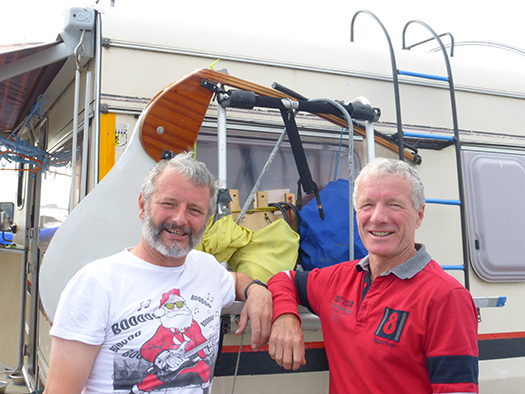
The Affordable Sailing Team – Norman Lee (right) with his brother Ken beside their campervan at last year's GP 14 Worlds at East Down YC on Strangford Lough. Photo: W M Nixon
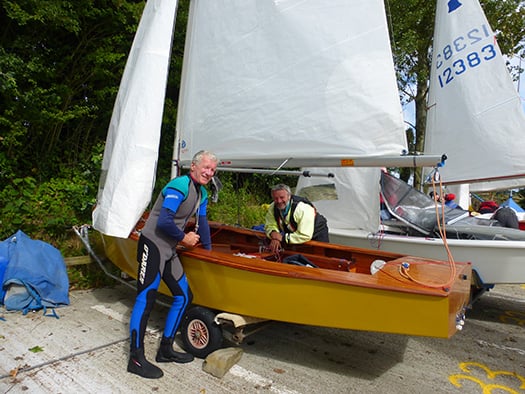
With their own very high can-do standards of boat maintenance, Norman and Ken Lee can keep their GP 14 in the competitive frame. Photo: W M Nixon
That said, the need to own one's own boat and tune and tinker with her to your heart's content is what sailing is all about for many of us, and Norman Lee is a classic case in point for this approach. He claims that his sailing costs him just €600 per year, though that of course is after he has paid for his well-tuned GP14, and he has long since written off the cost of the vintage camper-van which is home to the Lee Equipe when they hit the campaign trail.
Nevertheless the entire setup has to be outstandingly good value, and doing it in such economical style is part of the fun of it all. So when someone with Norman Lee's approach to sailing is prepared to get up at the big ISA public meeting in Dun Laoghaire and congratulate the team who have been working on the reforms which he and Bryan Armstrong set in train, then that is approval of a high order.
And as for just who or what is the ISA, can we maybe agree that ideally we all are the ISA, every last one of us who goes sailing or is even just interested in the sport, and it's up to us to keep it in line and encourage it to identify with and serve the ordinary sailor every bit as much as the high-flyer.
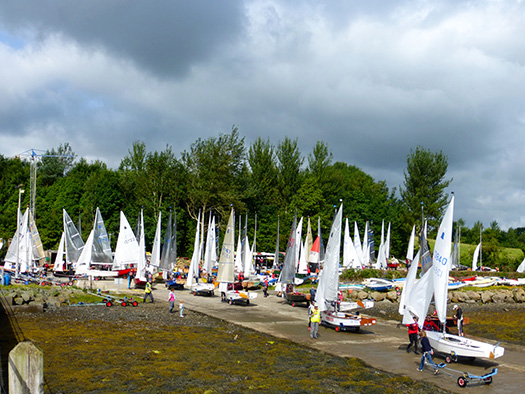
Private pleasure.....the 2014 GP 14 Worlds at East Down YC is about as high as many Irish sailors would expect or want to aim, and many are content with much lower-key regular club sailing. Photo: W M Nixon
Irish Sailing Becomes Third Best Funded Olympic Sport
#sailing – Irish Sailing is going to benefit from just under €1m in government funding in 2015, similar to 2014, but where sailing has made big gains is in the High Performance area. €250,000 for equipment for Rio, and €70,000 for Rio preparation were among the bonuses announced by the Minister today.
Sailing was in the top 10 of Irish sports in general funding, third in the High Performance funding, second in the Rio preparation funding and first in the HP equipment funding.
Total funds to sailing in 2015 from government sources is scheduled to be €1,289,900
By way of contrast, UK amounts are reported to be €33m over the four year Olympiad, while US has about €14m in the same time and Canada will benefit from about €700,000 in 2015.
However, it should be noted that Ireland is only supporting five of the 10 Olympic sailing disciplines, while UK and USA have full teams. And with a smaller pool, it could be argued that the Irish sailors are close to being among the best funded in the world right now. But such a suggestion would be 'completely misleading' as the Irish Sailing's High Performance manager James O'Callaghan points out; 'the programme funds cover 103 sailors involved from Optimist all the way up to the Olympics, not just the Olympic team itself'. 'At each stage of the pathway we have squads and coaches in place to help the sailors progress'.
O'Callaghan continues: 'We are very grateful for the ISC support but we still require additional sources of revenue to ensure our sailors have the best chance of success'.
Amount per discipline per year
UK €825,000 (10 disciplines)
US €350,000 (10 disciplines)
Ireland €257,800 (5 disciplines)
Canada €140,000 (5 disciplines)
There was huge success for Irish Sailing when Minister of State for Sport, Michael Ring T.D., today announced an investment package of €19.6m from the Irish Sports Council into the National Governing Bodies of Sport in Ireland.
The good news for sailing follows a similar announcement by the ISA this week that it intends to raise a further €2.75m itself to further fund the Irish Olympic sailing team.
Overall, The government is spending almost €1million more on sport than the equivalent figure for 2014. This will allow the Council invest in crucial projects for Rio 2016, exciting participation initiatives with a variety of sports and support the participation of Team Ireland at the Special Olympic Summer Games in LA in July.
The investment includes an allocation of €10.85 million to 59 National Governing Bodies (NGBs) to support their core work of administration and participation programmes. This includes increases to support specific initiatives in the IABA, the Confederation of Irish Golf and Hockey Ireland. The Council will allocate €600,000 to support the Women in Sport programme of 23 NGBs with additional support for the highly successful programmes of Swim Ireland and Badminton Ireland.
€8.16m will be invested in 22 Performance Plans which will support Ireland participation at the 2016 Rio Olympic and Paralympic Games. The high performance NGBs also benefit from the direct service provision at the Institute of Sport, the development of high performance facilities at the National Sports Campus, the 2015 International Carding Scheme and the special sports equipment grants; a comprehensive and integrated package of support for Ireland's top performers.
Speaking at today's announcement Minister Ring commented: "I am delighted to be here today to announce a very significant package of sports investment by the Irish Sports Council. Today's investment is a substantial commitment from the Irish Government to the National Governing Bodies of Sport in Ireland. The importance of sport cannot be understated. Sport has the unique ability to activate local communities through participation and volunteerism whilst uniting a nation to support our athletes on the world stage".
Today's investment is designed to support NGBs develop sustainable and effective structures that facilitate increased numbers of both participants and volunteers. The success of the sustained investment has seen considerable growth in membership across the NGB sector which includes 53,000 in Athletics Ireland, 23,000 in Cycling Ireland and 57,000 in Badminton Ireland.
Speaking at the announcement, Kieran Mulvey, Chairman of the Irish Sports Council said:
"The Council place National Governing Bodies at the centre of our work and are the strategic heart of Irish sport. This is a major input of resources into their operations and ongoing development and we have confidence that there will be a significant return on that investment. I want to acknowledge and recognise the on-going support given to us by Minister Ring and his Department which allows us to continue our mission of increasing participation and enhancing high performance."
2015 is the 10th Anniversary of the Irish Sports Council's Women in Sport programme. The programme, which aims to raise the overall physical activity levels among women, has been a key driver in closing the gender gap as women's participation has grown from 39% (2011) to 42.7% (2013). Today's investment will continue to support Women in Sport programmes including 'The Swim for a Mile' initiative from Swim Ireland which aims to deliver 10,000 participants and Rowing Ireland's, 'Get Going, Get Rowing' programme which aims to get an additional 5,000 women participating in 2015.
Ireland will be proudly represented at many sporting events on the international stage. 2015 will be the crucial qualifying year for many sports for Rio 2016 and there will be vital championships events in athletics, swimming, boxing, hockey, cricket and cycling amongst others. The first European Games will take place in Baku in June and it will be could prove to be a pivotal event for the Olympic sports in Ireland. The Council is delighted to support Team Ireland at the Special Olympics World Game in Los Angeles.
John Treacy, CEO Irish Sports Council said:
"As the 2016 Rio Olympic and Paralympic Games come into view, it is imperative we maintain investment so that we continue to build on the excellent performances of recent years in high performance sport. The resources made available in late 2014 by Minister Ring are invaluable for the sports and have been invested in vital equipment, camps and the all-important competition schedules".
Today's investment in High Performance will continue to build on the sustained success of high performance sport in Ireland. The Institute of Sport delivers sports services directly to the Olympic and Paralympic sports and, with athletes accessing services on site, is advanced in the creation of a new support system for high performance sport. The capacity at the Institute will be enhanced with the completion of the bespoke facility which is currently being constructed by the NSCDA on site and which in due for autumn 2015.
High Performance Sport: 2013 (€) - 2014 (€) - *2015 (€) - Rio
2013-2015
Olympic Council of Ireland: 396,776 - 378,987 - 450,382 - 1,226,145
Paralympics Ireland: 310,000 - 310,000 - 513,154 - 1,133,154
Athletics Ireland: 800,000 - 800,000 - 880,000 - 2,480,000
Badminton Ireland: 95,000 - 95,000 - 130,000 - 320,000
Irish Amatuer Boxing Association: 829,000 - 839,300 - 925,000 - 2,593,300
Canoeing Ireland: 50,000 - 65,000 - 65,000 - 180,000
Irish Clay Pigeon Shooting Association: 4,350 - 32,500 - 55,000 - 91,850
Cricket Ireland: 109,504 - 100,000 - 120,000 - 329,504
Cycling Ireland: 265,000 - 303,000 - 350,000 - 918,000
Golf (GUI and ILGU): 375,000 - 375,000 - 390,000 - 1,140,000
Gymnastics Ireland: 47,500 - 60,000 - 107,500
Irish Hockey Association: 400,000 - 420,000 - 450,000 - 1,270,000
Horse Sport Ireland: 525,000 - 510,000 - 550,000 - 1,585,000
Irish Judo Association: 30,000 - 40,000 - 50,000 - 120,000
Paralympic Sports: 613,000 - 610,000 - 665,000 - 1,888,000
Pentathlon Ireland: 190,000 - 170,000 - 180,000 - 540,000
Rowing Ireland: 380,000 - 380,000 - 410,000 - 1,170,000
Irish Rugby Football Union: 275,000 - 275,000 - 275,000 - 825,000
Irish Sailing Association: 643,000 - 632,000 - 635,000 - 1,910,000
Swim Ireland: 524,000 - 530,500 - 560,000 - 1,614,500
Tennis Ireland: 160,000 - 160,000 - 175,000 - 495,000
Triathlon Ireland: 260,000 - 260,000 - 275,000 - 795,000
Total: 7,234,630 - 7,333,787 - 8,163,536 - 22,731,953
The details of the €1.6 million investment in the 2015 International Carding Scheme will be announced at a later date. The transition of the Scheme to athletics, sailing swimming has proven to be successful and four more sports (rowing, triathlon, cycling and badminton) are currently in the transition phase.
General Investment
1. The Irish Sports Council received an Oireachtas Grant of €42.5m in 2015. As announced in Budget 2015, this is the same budget as in 2014.
2. In December 2014, a special allocation of current funds to support qualification, preparation and participation at the 2016 Rio Olympic and Paralympic Games was provided to 18 sporting bodies. This money was provided in 2014 for expenditure on 2015 plans; it is recorded in these documents under the 2015 headings.
3. In November 2014, a special allocation of capital funds for sports equipment was provided to 15 NGBs. While the scheme was not targeted at high performance many NGBs used the funds to support their Performance Plans for 2015. For example, Sailing and Rowing were able to purchase boats and other equipment to support the preparation and participation at the Rio Games.
Core Investment
4. Special Olympics Ireland has received additional investment to support participation and preparation for the World Summer Games 2015. This follows the special allocation of funds in 2014 for the European Games. In total, an additional €250,000 has been allocated to support Special Olympic participation and preparation ay major games over a two year period.
5. Additional investment has been provided to the Irish Amateur Boxing Association, in both core and high performance, to strengthen the capacity of organisation with new appointments.
6. The Confederation of Golf in Ireland has received additional investment to support the increased responsibilities of the organisation and continue the development of Golf in Ireland.
7. In late 2014 Cycling Ireland received an investment of €50,000 to support the capacity of the organisation to support mass participation events. This is recorded in their core budget of 2014.
8. Also in 2014 Table Tennis Ireland received €15,000 to support a schools initiative and this is recorded under the 2014 core budget.
9. Hockey Ireland and the Irish Sailing Association have received additional seed investment to support the development fund on raising capacity on a pilot basis.
Women in Sport Investment
10. The Women in Sport programme for 2015 will total €600,000.
11. Substantial increases have been provided to Badminton Ireland and Swim Ireland to support an expansion of their successful programmes from 2014 including 'Swim a Mile', "Women on Court", "Women @ Heart" and "Girls on Court".
High Performance Investment
12. The Olympic Council of Ireland is entering into one of the most important and busiest years in its history. It has received additional investment to support its wide range of activities including the preparation and participation for the Rio 2016 Games, Youth Olympics and 1st European Olympics in Baku.
13. Paralympics Ireland has received significant additional investment to support the holding of training camps in 2015. The investment will allow Paralympics Ireland replicate the preparation system used in advance of London 2012 which proved to be so successful.
14. Increases in High Performance grants have been allocated to Athletics Ireland, Cycling Ireland and Horse Sport Ireland to continue the successful performance programmes in the lead up to Rio.
15. The Sports Equipment grants allowed Sailing and Rowing purchase boats and essential equipment for the Rio 2016 campaign.
16. Gymnastics Ireland and the Irish Clay Pigeon Shooting Association received High Performance Investment in 2014 and 2015. This was on the basis of an improved level of planning by the NGB and of performances by the athletes.
#sailing – The Irish Sailing Association (ISA) has issued a statement outlining how monies raised in its new Olympic initiative called 'The Irish Sailing Foundation' will be spent.
News of the new initiative that aims to raise €2.75m per year – nearly three times the turnover of the association – appeared in a recruitment advertisement for a new 'ISF' CEO in last Friday's Irish Times and appeared again in weekend newspapers.
The advertisment said it expects the ISF to build 'philanthropic fund raised income to €2.75 million annually in support of the high performance mission and programmes'.
The text of the advertisement also appeared briefly on the ISA website this week but has since been replaced with the updated statement (see below).
According to an ISA insider, there is 'concern' at board level that the initiative appeared to be 'at odds' with its recently launched strategic plan that intends to 'redress the perceived imbalance' between the support structures for those competing in the non-Olympic area and those involved with the High Performance area –essentially the Olympic area.
Today's statement points out any funds raised will also 'provide a contribution towards the development of a National Coaching programme which will be accessible to sailors of all interests and levels of ability'.
The ISA statement refers to the initiative as a 'pilot scheme' with the financial support of the Irish Sports Council.
The original advert is here and The full ISA statement is below:
The ISA is pleased to announce an innovative funding initiative to support Irish Sailing. With the financial support of the Irish Sports Council, a pilot scheme, to be called "The Irish Sailing Foundation" has been established to raise finance from sources other than those which traditionally provide sponsorship to sailing on a national and regional level. The funds are intended to be applied to the continued support of Elite Youth and Olympic development together with providing a contribution towards the development of a National Coaching programme which will be accessible to sailors of all interests and levels of ability.
The funding for the initiative will come from the resources of the Olympic Steering Group which manages the High Performance activities of the ISA.
The recruitment process to identify an experienced professional fund raiser to manage the project has commenced.
David Lovegrove, President of the ISA, in welcoming the initiative, said it was important that sailing explored new ways of funding to position itself with adequate finance to make longer term investment commitments to the development of the sport.
Irish Sailing Association Aims to Raise €2.75m Annually for Olympic Team
#irishsailingfoundation – A new Irish Sailing Association (ISA) organisation called the 'Irish Sailing Foundation (ISF)' expects to build 'philanthropic fund raised income to €2.75 million annually in support of the high performance mission and programmes'. The new organisation is seeking to recruit a Chief Executive that is 'an exceptional leader with a track record of building income' to change the funding of high performance sailing in Ireland.
The Irish Sailing Association recently published its new strategic plan and it is currently meeting sailing clubs from around the country to outline details of the plan.
After a period of controversy over association policies, the new plan outlines a vision for sailing until 2020 and confirms sailing as the third best supported sport by Irish Sports Council.
A main change proposed for the ISA in the plan is an 'emphasis on upgrading the support structures for sailors not involved in the ISA High Performance'.
The plan refers to the development of 'professional fund-raising' for its high performance team but it does not refer specifically to the set up of a new organisation nor does it refer to the 'Irish Sailing Foundation'.
As Afloat reported previously, the recruitment advertisement for the ISF's new CEO was advertised in last Friday's Irish Times and across Sunday national newspapers too. It is also posted on the association's website.
The high performance objective is to secure top 8 results for Irish sailors in the Olympic Classes at Worlds, Europeans and Olympics. To do this it focuses on identifying, supporting and coaching sailors who can succeed in Olympic competition. The advert says 'securing of significant philanthropic support and augmenting the funding provided by the Irish Sports Council will improve performance at Olympic level, increase the level of competition for those on squads and widen access and participation'.
More details and a copy of the advert for download is available here.
Sailors Can Take Lead In Encouraging Growth Of Sport Says Lee
#ISA - Wicklow's Norman Lee has "very positive" feelings for the new course plotted for Irish sailing in the ISA's new strategic plan.
But the dinghy sailor echoes Afloat blogger Magheramore's comments earlier today that lasting change in the sailing scene requires real commitment from our clubs and classes.
Speaking to Afloat.ie, Lee says that "unless boat owners and other people involved in sailing actively encourage and facilitate newcomers to participate, he reorganisation will not achieve much."
Yet while Magheramore believes sailing clubs can take charge of this by changing to a 'pay for play' model whereby members would sail a club-owned fleet, potentially opening access to sailing as a sport and pastime wider than ever, Lee sees it as "one of our problems" that "too many stand back and expect the ISA or the clubs to fix things."
He suggests that sailors themselves in general could be more welcoming to newcomers, taking them out on the water "to experience the things they need to experience to get hooked."
He adds: "Most claim they are too busy or their boat isn’t suitable or they would lose points, all these selfish Tiger excuses need to be dropped if members are serious about reversing the flow and growing the sport."
Lee is also outspoken about the need for changes in club junior training, such as reducing the number of modules to save on time and costs "when all most people want is the basics so that they can safely helm or crew".
He feels strongly "that one or two seasons learning the basics should be followed immediately by channelling into normal club racing/activities. The certificate chase should only be for a few who are keen to instruct and have shown reasonable sailing ability and genuine interest in the sport."
In terms of development, Lee believes it is "good to shift the focus onto regional development officers (RDOs) getting to know the grassroots, but the job is too big for two or even three.
"Four might be okay, but only if their range of duties and job spec is kept very tight and practical. At present it seems impossible."
Overall, however, Lee maintains that the "huge work" put in over the last two years in charting a new direction for Irish sailing has been an "uplifting experience and, if it continues in the way proposed, will turn Irish sailing around and be the prototype for similar change needed in other jurisdictions."



























